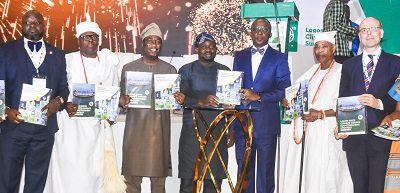By Sodiq Adelakun
The Lagos State Government has reaffirmed its commitment to tackling climate change, launching the Lagos Climate Adaptation and Resilience Plan (LCARP) and Lagos Climate Change Mainstreaming Strategy at the 10th Lagos International Climate Change Summit.
Governor Babajide Sanwo-Olu, represented by his deputy, Dr. Kadri Obafemi Hamzat on Tuesday emphasised the urgent need for action, acknowledging that climate change is a present reality requiring immediate solutions.
The state government set out to reduce emissions and mitigate climate change challenges, leveraging its unique attributes to defy the odds and make significant progress.
He mentioned that Lagos has gone through implementation of a multi-modal Transit BRT System, adding that these initiatives and more have improved the health and safety of Lagosians and have reduced carbon emission from transportation by about 15 percent.
He stressed that in 2015, the comity of Nations reached a landmark agreement to keep global temperature below 1.5 degrees centigrade adding that Lagos responded by developing a second 5year Climatic Action Plan outlining goals and strategies for emission reduction.
The Governor said with the unveiling of the first Nigerian electric car in Lagos in November 2020, the state intends to replace 50 percent of the public transportation fleet with electric vehicles by 2030.
“The red and blue line projects recently launched are crucial for reducing the carbon footprint, decreasing vehicular emission, cutting down travel times and promote a sustainable low carbon future for Lagos,” he said.
Sanwo-Olu emphasised that the state has successfully signed partnership deals with a private Waste Consortium to build a waste to energy Plant that will provide electricity for about 40,000 homes and convert 2,250 tonnes of waste daily.
Earlier in his welcome address, the Commissioner for the Environment and Water Resources, Mr. Tokunbo Wahab noted that the solution to climate change lies in climate resilient development which involves integrating adaptive measures with actions to reduce or avoid greenhouse gas emissions in ways that provide wider benefits.
He highlighted that the summit theme, “Accelerating Climate Finance and Championing Local Adaptation Initiatives,” aims to explore ways of attracting climate finance into the adaptation space as well as to create livable and resilient infrastructure.
He said from the inaugural summit to the tenth edition, the state had witnessed a transformative shift in global consciousness towards climate action, adding that each summit had been a stepping stone, building upon the achievements of the last, propelled forward by the tireless efforts of countless climate heroes.
He stated that over the past decade, the Lagos International Climate Change Summit has served as a platform for dialogue, collaboration, and innovation in addressing climate related issues in the State.
”From promoting renewable energy to implementing sustainable waste management practices, we have made significant strides in integrating Climate Actions in Lagos State Development Investment Opportunities and building resilience in the face of climate variability,” he added.
He said amidst the celebration of past achievements, the state is also confronted with the stark realities of the present situation saying the global 6th Assessment Report (AR6) of the IPCC serves as a sobering reminder of the urgency of the situation and the need for immediate action.
He emphasised that this year’s summit is therefore not just a forum for discussion, but a clarion call for action saying that everyone must accelerate the efforts to mobilise climate finance and channel it towards projects that prioritise local adaptation initiatives.
Wahab reiterated that the aforementioned means investing in infrastructure that can withstand the impacts of climate change, empowering communities to develop climate-resilient livelihoods, and enhancing our capacity to respond to climate-related disasters.
At a special session titled “Climate Change Initiatives: The Journey So Far,” former Lagos State Governor, Babatunde Raji Fashola (SAN), emphasised that human actions and natural causes contribute to climate change.
He praised the effectiveness of the International Climate Change Summit, launched in 2009, and acknowledged Lagos State’s leadership role in climate change initiatives.
He highlighted the significance of the 10th edition of the Summit, showcasing Lagos State’s continued commitment to addressing climate change challenges.

